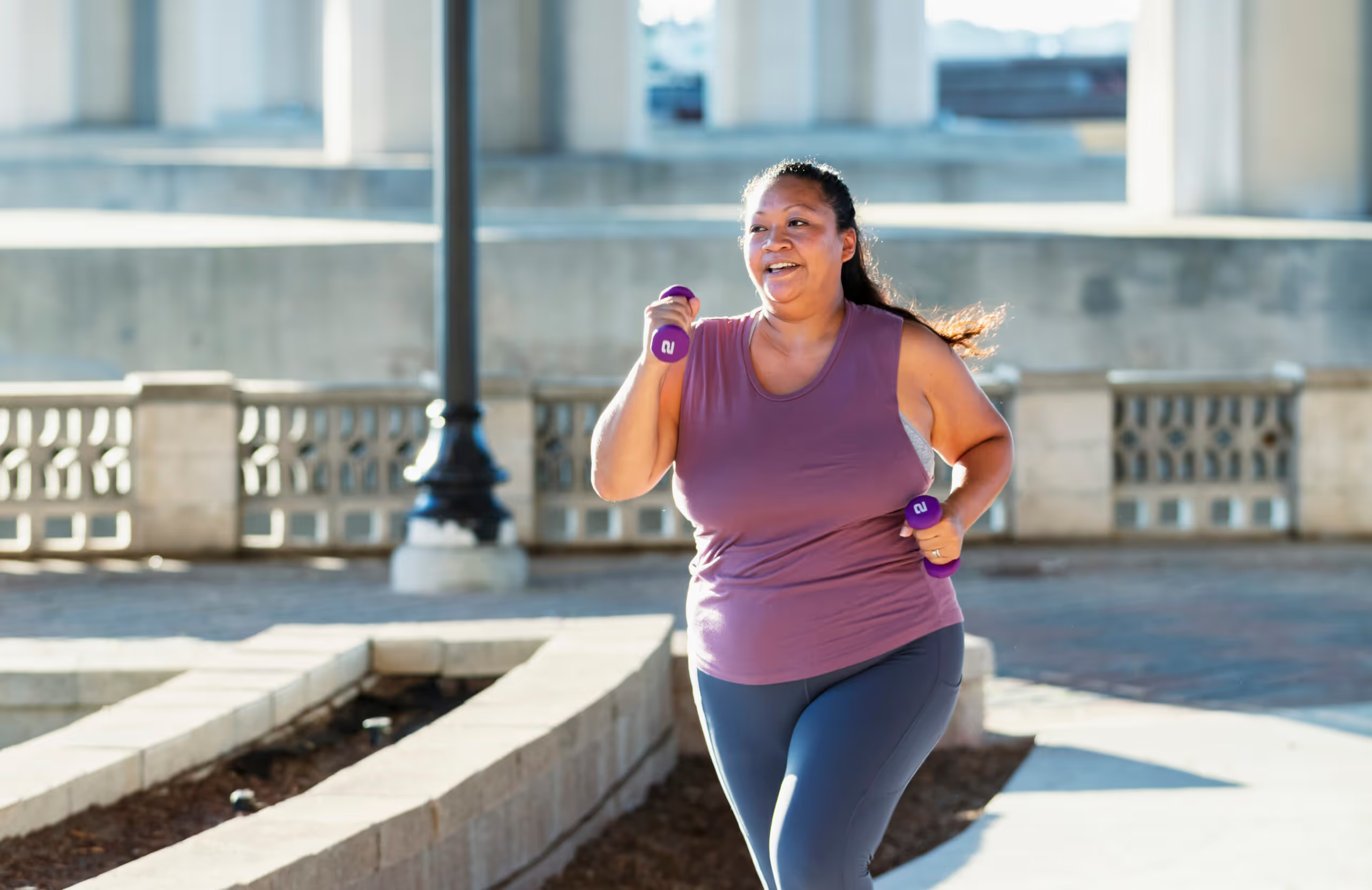Most people understand the standard equation for weight loss is energy (i.e. calories) expended needs to exceed energy taken in. In fact, you must expend 3500 calories more than you take in over time to lose one pound. Scientific studies prove that low calorie, nutrient dense diets and increased physical activity form the foundation needed for a 500 calorie/day deficit to promote weight loss.
This leads many to believe that exercise, specifically cardio, is necessary to be successful with weight loss. However, for some, the thought of heart pounding cardio is enough to avoid physical activity or weight loss attempts altogether. This brings us to the big question, can you lose weight without cardio and is cardio the best way to lose weight?
Understanding cardio
Cardio, also known as cardiovascular activity or aerobic exercise, refers to any exercise that increases heart rate and respiration by repeatedly moving large muscle groups. In addition to weight loss benefits, cardio can improve the function and performance of your heart, lungs, and circulatory system, reduce risk of chronic disease, improve mood, and reduce stress. Examples of cardio exercise include:
- Walking/Power Walking
- Running/Jogging
- Dancing
- Swimming
- Cycling
- Organized sports such as basketball or soccer
- Jumping rope
- Boxing
- Rowing
- High Intensity Interval training HIIT
- Elliptical
- Climbing stairs (i.e. Stairmaster)
- Hiking
- Hula hooping
- Aerobics classes
Is cardio the best way to lose weight?
One study in a systematic review reported a higher weight and fat loss in participants who completed aerobic training vs. resistance training, and with a combination of aerobic and resistance training vs. resistance training alone. However, another study in the same review found significant weight loss in the exercise group vs. a non-exercise control group, independent on the type of exercise training performed (i.e. aerobic training or resistance training or both) proving that you can lose weight without cardio.
It is important to note that achieving a daily calorie deficit is the most important aspect of weight loss. A calorie deficit can be accomplished by following a low calorie, nutrient dense diet, developing an individualized workout routine, and/or developing a medical weight loss plan with your physician.
Redefining cardio
Many people often think of running or HIIT (High Intensity Interval Training) when they hear the word cardio, but in reality, cardio is any activity that increases your heart rate. Popular alternative forms of cardio include: Dancing, cycling, aquatics exercises, walking, and hiking.
See table below for alternative forms of cardio and their benefits.

Losing weight without cardio
So can you lose weight without cardio or is cardio the best way to lose weight? While cardio can contribute to weight loss via energy expenditure, it is important to understand that a calorie deficit can be achieved without cardio.
Consume a Nutrient Dense Diet
One common method of achieving a calorie deficit is to reduce the amount of calories you consume throughout the day. Consuming a nutrient dense diet; one that is full of vitamins, minerals, protein, and fiber can significantly help lower the amount of calories you consume throughout the day.
Nutrient dense foods include vegetables, fruits, beans, lean protein (i.e. chicken, turkey, fish, 96% lean ground beef, center cut pork chops, tenderloin, sirloin, tofu, edamame), and whole grains (i.e. 100% whole wheat bread, oats, brown rice, quinoa). Avoiding or limiting high calorie, processed foods such as fried foods, sugary foods and beverages, and fast food is essential in obtaining a calorie deficit.
Portion control is another important aspect of achieving a daily calorie deficit. Eating off of a smaller plate or utilizing the plate method assists with portion and calorie control. Simply fill ¼ of your plate with lean protein, ¼ with whole grains and ½ with nutrient dense fruits and non-starchy vegetables. Limit healthy fats (i.e. nuts, olive oil, avocado, seeds) to 1-2 tbsp as they are calorie dense.
Choose alternative forms of exercise
Resistance Training: Resistance training, also known as weight or strength training, involves exercising muscles using some form of resistance such as weights, bands, weight machines, or your own body weight.
Resistance training contributes to weight management by building muscle strength and endurance, which in turn can reduce body fat and increase one's metabolism. An average 200 lb person can burn up to 137 calories per 30 minutes with light weight training (5). A recent study found that women who completed resistance training in addition to a reduced calorie diet lost a greater amount of fat mass than women on a reduced calorie diet alone (6).
In addition to weight management and muscle toning benefits, resistance training helps maintain flexibility and balance, reduces cognitive decline, reduces risk of osteoporosis, heart disease and diabetes, reduces stress, and improves mood and sleep (4).
Yoga: An ancient Hindu practice that incorporates breath control, meditation, and gentle exercises and stretches. Yoga is often practiced in a studio, gym, or at home with a video guided yoga practice. A 200 lb person can burn up to 137 calories in 30 minutes while doing yoga (5). For maximum calorie burn, practice Vinyasa or Hot yoga. In addition to weight management benefits, yoga improves strength, balance, and flexibility, helps with back pain relief, eases arthritis symptoms, improves heart health, improves relaxation and sleep, increases energy and mood, and reduces stress.
Pilates: Pilates is a popular, low-impact exercise effective for toning and building lean muscle, and improving posture and flexibility. Combined with a healthy diet, pilates can be an effective form of weight loss. A 200lb person can burn up to 146 calories in 30 minutes while doing pilates. A small study completed in 2017 found that practicing pilates for 8 weeks led to weight loss, lower BMI, and reduced waist and hip circumference in women with obesity (7). Additional benefits of pilates include improved coordination and balance, safe rehabilitation of joint and spinal injuries, improved concentration, and reduced stress.
Non-exercise activity thermogenesis (NEAT): NEAT refers to the energy expended for everything we do that is not sleeping, eating, or sports-like exercise. It includes the energy expended from a variety of activities such as walking to work, typing, performing yard work, cleaning the house, and fidgeting (8). Increasing NEAT is an easy way to increase your energy expenditure throughout the day without cardio. For example, a 200 lb person burns approximately 82 calories an hour while performing their office job in a seated position, but burns 137 calories an hour if performing those same office duties while standing (9).
Here are some ways you are increase your daily NEAT:
- Park further away from buildings
- Purchase a standing desk at work
- Take the stairs instead of the elevator
- Walk to visit a coworker instead of sending an email
- Walk in place while cooking or cleaning
- Do more household chores
- Take 5 minute walking breaks to walk around the office or home
- Walk or pace while talking on the phone
Partner with a medical weight loss program
Collaborating with a Board Certified weight loss physician and a Registered Dietitian as part of a medical weight loss program is an effective way to get the education, tools, and support you need to lose weight with or without cardio. Participating in a weight loss program allows you and your medical team to develop an individualized weight loss plan that fits into your lifestyle and meets your personal goals. Together, you can create a personalized nutrition and exercise plan to achieve the calorie deficit needed for weight loss. In addition, your clinical team will provide you with the accountability and encouragement you need to make change happen.
Find a weight loss plan that’s enjoyable and works!
While cardio can be effective in assisting with weight loss, it is possible to lose weight without cardio. In fact, cardio may not be the best way to lose weight. The best way to lose weight is to develop an individualized plan to reach a calorie deficit that works for you and is sustainable over time. Whether that is through consuming a low calorie, nutrient dense diet, participating in alternative forms of exercise and/or collaborating with a Board Certified weight loss physician and Registered Dietitian, finding a plan you can enjoy and maintain is key.
Let Form Health help you discover which exercises & lifestyle changes you genuinely enjoy and develop a plan just for you to help you reach your weight loss and health goals. To find out more, take our quiz online.




